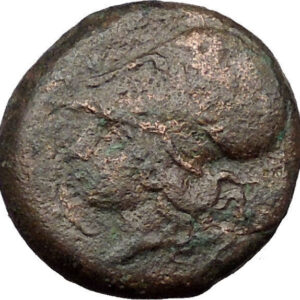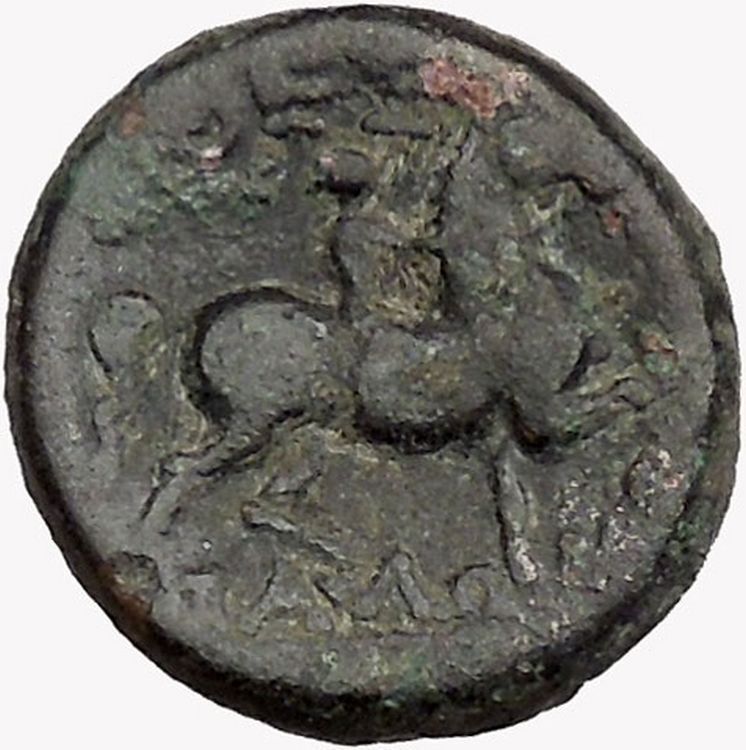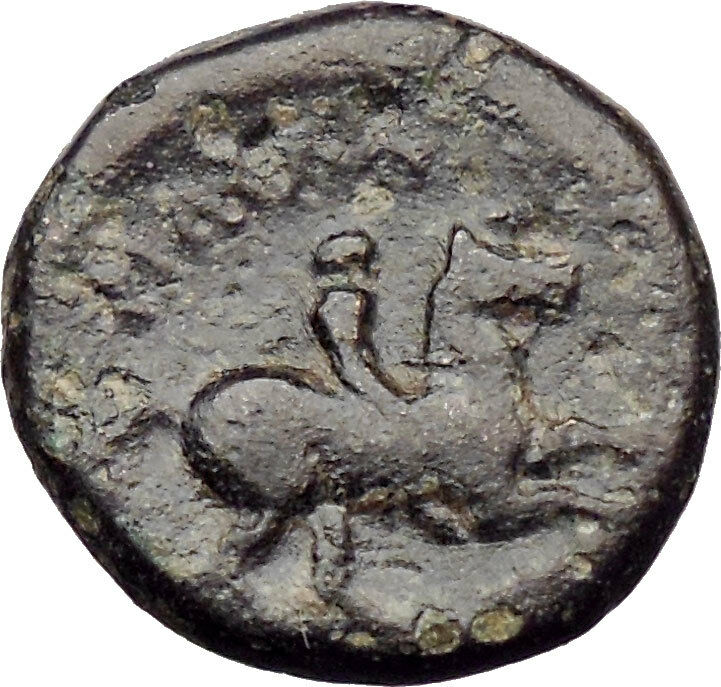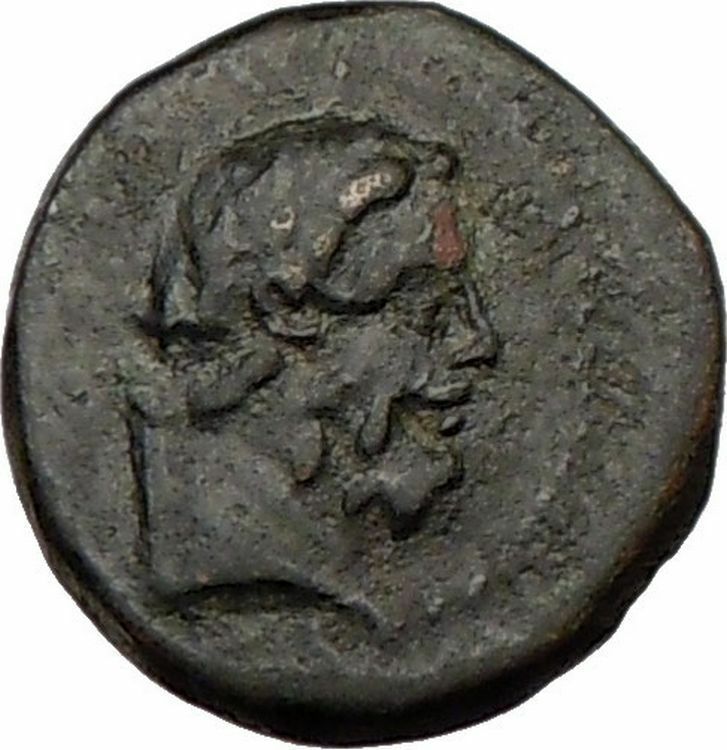|
Greek Coin of Seleukid Kingdom
Seleukos IV, Philopator – King: 187-175 B.C.
Serrated Edge Bronze 22mm Antioch mint, struck circa 187-175 B.C.
Reference: Sear 6968; B.M.C. 4. 32,22; SC 1315.6n; HGC 9, 584
Certification: NGC Ancients F 6156464-035
Laureate head of Apollo right, monogram behind.
ΒΑΣΙΛΕΩΣ / ΣEΛΕYKOY either side of naked Apollo standing left, holding arrow and resting left arm on tripod; monogram in field to left.
The kingdom bequeathed by Antiochos the Great to his son, Seleukos IV, was very different from the one which he himself had ruled just a few years before. Asia minor was lost to the kings of Pergamon, the eastern provinces of Parthia and Baktria were not firmly established as independent kingdoms, and in addition Seleukos had to pay a heavy annual war-indemnity to the Romans. What was left to the Seleukid realm he seems to have governed wisely and well until 175 B.C. when he was murdered by his minister Heliodoros.
You are bidding on the exact item pictured, provided with a Certificate of Authenticity and Lifetime Guarantee of Authenticity.
 In Greek and Roman mythology, Apollo, is one of the most important and diverse of the Olympian deities. The ideal of the kouros (a beardless youth), Apollo has been variously recognized as a god of light and the sun; truth and prophecy; archery; medicine and healing; music, poetry, and the arts; and more. Apollo is the son of Zeus and Leto, and has a twin sister, the chaste huntress Artemis. Apollo is known in Greek-influenced Etruscan mythology as Apulu. Apollo was worshiped in both ancient Greek and Roman religion, as well as in the modern Greco-Roman Neopaganism. In Greek and Roman mythology, Apollo, is one of the most important and diverse of the Olympian deities. The ideal of the kouros (a beardless youth), Apollo has been variously recognized as a god of light and the sun; truth and prophecy; archery; medicine and healing; music, poetry, and the arts; and more. Apollo is the son of Zeus and Leto, and has a twin sister, the chaste huntress Artemis. Apollo is known in Greek-influenced Etruscan mythology as Apulu. Apollo was worshiped in both ancient Greek and Roman religion, as well as in the modern Greco-Roman Neopaganism.
As the patron of Delphi (Pythian Apollo), Apollo was an oracular god – the prophetic deity of the Delphic Oracle. Medicine and healing were associated with Apollo, whether through the god himself or mediated through his son Asclepius, yet Apollo was also seen as a god who could bring ill-health and deadly plague as well as one who had the ability to cure. Amongst the god’s custodial charges, Apollo became associated with dominion over colonists, and as the patron defender of herds and flocks. As the leader of the Muses (Apollon Musagetes) and director of their choir, Apollo functioned as the patron god of music and poetry. Hermes created the lyre for him, and the instrument became a common attribute of Apollo. Hymns sung to Apollo were called paeans.
In Hellenistic times, especially during the third century BCE, as Apollo Helios he became identified among Greeks with Helios, god of the sun, and his sister Artemis similarly equated with Selene, goddess of the moon. In Latin texts, on the other hand, Joseph Fontenrose declared himself unable to find any conflation of Apollo with Sol among the Augustan poets of the first century, not even in the conjurations of Aeneas and Latinus in Aeneid XII (161-215). Apollo and Helios/Sol remained separate beings in literary and mythological texts until the third century CE.
 Seleucus IV Philopator (Greek: Σέλευκος Δ΄ Φιλοπάτωρ; c. 218 – 175 BC), ruler of the Hellenistic Seleucid Empire, reigned from 187 BC to 175 BC. He was the second son and successor of Antiochus III the Great and Laodice III. Seleucus IV wed his sister Laodice IV, by whom he had three children: two sons Antiochus, Demetrius I Soter and a daughter Laodice V. Seleucus IV Philopator (Greek: Σέλευκος Δ΄ Φιλοπάτωρ; c. 218 – 175 BC), ruler of the Hellenistic Seleucid Empire, reigned from 187 BC to 175 BC. He was the second son and successor of Antiochus III the Great and Laodice III. Seleucus IV wed his sister Laodice IV, by whom he had three children: two sons Antiochus, Demetrius I Soter and a daughter Laodice V.
He was compelled by financial necessities, created in part by the heavy war-indemnity exacted by Rome, to pursue an ambitious policy. In an effort to collect money to pay the Romans, he sent his minister Heliodorus to Jerusalem to seize the Jewish temple treasury.
The Bible tells of a prophecy given by a messenger angel in Daniel 11:20 (NLT). The text states that Seleucus “will be remembered as the king who sent a tax collector to maintain the royal splendor.” The deuterocanonical lends more to this in 2 Maccabees 3:2-3… “It came to pass that even the kings themselves, and the princes esteemed the place [the Temple in Jerusalem] worthy of the highest honour, and glorified the temple with very great gifts: So that Seleucus king of Asia allowed out of his revenues all the charges belonging to the ministry of the sacrifices.”
On his return from Jerusalem, Heliodorus assassinated Seleucus, and seized the throne for himself. The true heir Demetrius, son of Seleucus, was now being retained in Rome as a hostage, and the kingdom was seized by the younger brother of Seleucus, Antiochus IV Epiphanes. Antiochus managed to oust Heliodorus and an infant son of Seleucus, also named Antiochus, was formal head of state for a few years until Epiphanes had him murdered.
 The Seleucid Empire was a Hellenistic state ruled by the Seleucid dynasty founded by Seleucus I Nicator following the division of the empire created by Alexander the Great. Seleucus received Babylonia and, from there, expanded his dominions to include much of Alexander’s near eastern territories. The Seleucid Empire was a Hellenistic state ruled by the Seleucid dynasty founded by Seleucus I Nicator following the division of the empire created by Alexander the Great. Seleucus received Babylonia and, from there, expanded his dominions to include much of Alexander’s near eastern territories.
The Seleucid Empire was a major center of Hellenistic culture that maintained the preeminence of Greek customs where a Greek-Macedonian political elite dominated, mostly in the urban areas. The Greek population of the cities who formed the dominant elite were reinforced by emigration from Greece. Seleucid expansion into Anatolia and Greece was abruptly halted after decisive defeats at the hands of the Roman army. Their attempts to defeat their old enemy Ptolemaic Egypt were frustrated by Roman demands. Much of the eastern part of the empire was conquered by the Parthians under Mithridates I of Parthia in the mid-2nd century BC, yet the Seleucid kings continued to rule a rump state from the Seleukid Kingdom until the invasion by Armenian king Tigranes the Great and their ultimate overthrow by the Roman general Pompey.
|









 In Greek and Roman mythology, Apollo, is one of the most important and diverse of the Olympian deities. The ideal of the kouros (a beardless youth), Apollo has been variously recognized as a god of light and the sun; truth and prophecy; archery; medicine and healing; music, poetry, and the arts; and more. Apollo is the son of Zeus and Leto, and has a twin sister, the chaste huntress Artemis. Apollo is known in Greek-influenced Etruscan mythology as Apulu. Apollo was worshiped in both ancient Greek and Roman religion, as well as in the modern Greco-Roman Neopaganism.
In Greek and Roman mythology, Apollo, is one of the most important and diverse of the Olympian deities. The ideal of the kouros (a beardless youth), Apollo has been variously recognized as a god of light and the sun; truth and prophecy; archery; medicine and healing; music, poetry, and the arts; and more. Apollo is the son of Zeus and Leto, and has a twin sister, the chaste huntress Artemis. Apollo is known in Greek-influenced Etruscan mythology as Apulu. Apollo was worshiped in both ancient Greek and Roman religion, as well as in the modern Greco-Roman Neopaganism. Seleucus IV Philopator (Greek: Σέλευκος Δ΄ Φιλοπάτωρ; c. 218 – 175 BC), ruler of the Hellenistic Seleucid Empire, reigned from 187 BC to 175 BC. He was the second son and successor of Antiochus III the Great and Laodice III. Seleucus IV wed his sister Laodice IV, by whom he had three children: two sons Antiochus, Demetrius I Soter and a daughter Laodice V.
Seleucus IV Philopator (Greek: Σέλευκος Δ΄ Φιλοπάτωρ; c. 218 – 175 BC), ruler of the Hellenistic Seleucid Empire, reigned from 187 BC to 175 BC. He was the second son and successor of Antiochus III the Great and Laodice III. Seleucus IV wed his sister Laodice IV, by whom he had three children: two sons Antiochus, Demetrius I Soter and a daughter Laodice V. The Seleucid Empire was a Hellenistic state ruled by the Seleucid dynasty founded by Seleucus I Nicator following the division of the empire created by Alexander the Great. Seleucus received Babylonia and, from there, expanded his dominions to include much of Alexander’s near eastern territories.
The Seleucid Empire was a Hellenistic state ruled by the Seleucid dynasty founded by Seleucus I Nicator following the division of the empire created by Alexander the Great. Seleucus received Babylonia and, from there, expanded his dominions to include much of Alexander’s near eastern territories.




